It’s time for your first job hunt!
You need to write a resume, which can be nerve-wracking if you don’t have any real-life work experience.
You don’t know where to start, what to include, or which resume format to choose.
On top of that, most advice you find online isn’t relevant because it focuses on emphasizing professional background.
Chances are, you’re straight out of college with no experience to speak of.
Or maybe you're a high-school student applying for a part-time job.
Whichever the case may be, you’re probably having trouble filling in the blank space on your resume that’s supposed to be the work experience section.
Worry not, though. In this guide, we’re going to help you create an AMAZING resume, no work experience is needed.
- How to format your resume with no work experience
- 4 sections to replace work experience (that help you stand out)
- 2 no-work experience resume samples (guaranteed to land you the job)
How to Format Your Resume [with No Work Experience + Examples]
A resume format is the layout of your resume.
The ideal resume format usually depends on how much work experience you have.
But what happens when you have none?
For a no-experience resume, we recommend that you use the reverse-chronological format.
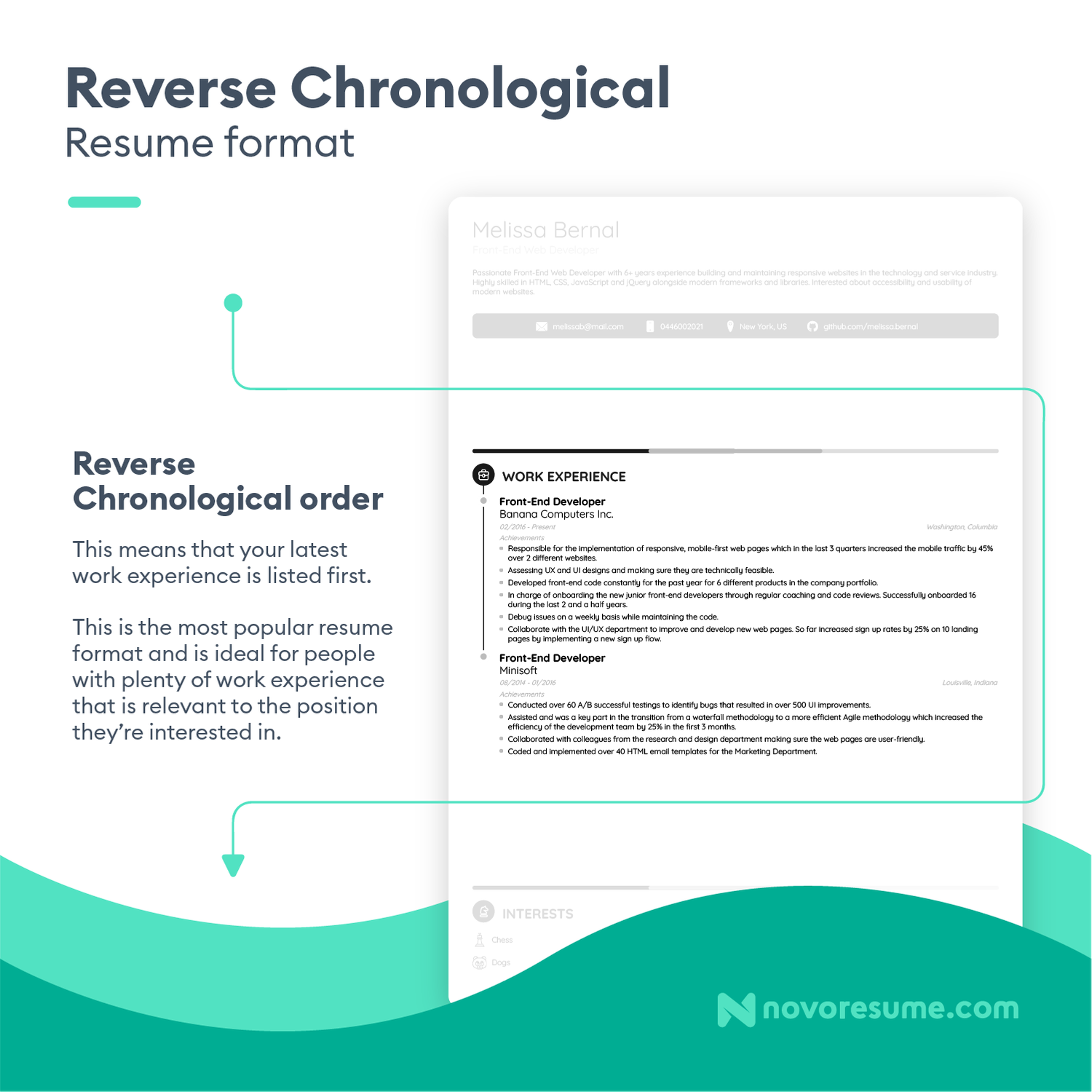
It’s the most popular format amongst applicants and a recruiter favorite.
The sections in your reverse-chronological resume will be:
- Header: Contact Information and Resume Statement
- Education
- Internships, extracurricular activities, projects, volunteer work (These sections will replace your work experience)
- Skills
In this article, we’ll walk you through each of these sections, and explain how to write them in a way that you stand out from the crowd.
Ready?
Let’s dive in.
Start With Your Resume Header

Your resume header includes your contact information and your resume statement.
Below, we’ll show you how to write both of these elements and how to include them in your header section.
Put Down Your Contact Information
Just like the name suggests, the first thing you add to your header is your personal and contact information.
It’s the easiest part to get right, just keep it short and to the point.
In your contact information section, mention the following:
- First and Last Name
- Phone Number
- E-mail Address
- A link to a professional profile (e.g. LinkedIn) or personal webpage (if you have one)
Make sure to use a professional-sounding E-mail.
I.e. something along the lines of “FirstName.LastName@gmail.com.”
You’re sure to leave a wrong impression if you use an email you created back in preschool (“hotshot999@hotmail.com”).
Make sure to double-check, triple-check your contact information. After all, the recruiter can’t contact you if you have a typo in your phone number.
(Optional) Write Your Resume Objective
A resume objective is a short heading statement in your resume, where you describe your professional goals and aspirations.
Fun fact - hiring managers look at your resume for 5-6 seconds max.
Yep, that’s right. In most cases, the hiring manager is literally drowning in resumes. So, they have a couple of seconds to skim each one.
Well, this section is your chance to catch their attention (and let them know you’ve got what it takes).
A resume objective is usually 3-4 sentences max and includes information on:
- What your field of study is;
- What your skills and experiences are (ones that are relevant to the job);
- Why you’re applying for this position and/or this company.
As with contact information, you don’t need to label your resume objective with a title. Just write it underneath your contact information section.
Here’s an example of what a resume objective looks like:
“Recent Communications graduate looking to apply for the role of Secretary at XYZ inc. Extremely organized with good writing and multitasking skills. Practical experience in management gained through several university projects, which involved coordinating tasks between different team members and ensuring that everyone was in sync with the latest information.”
Emphasize Your Education
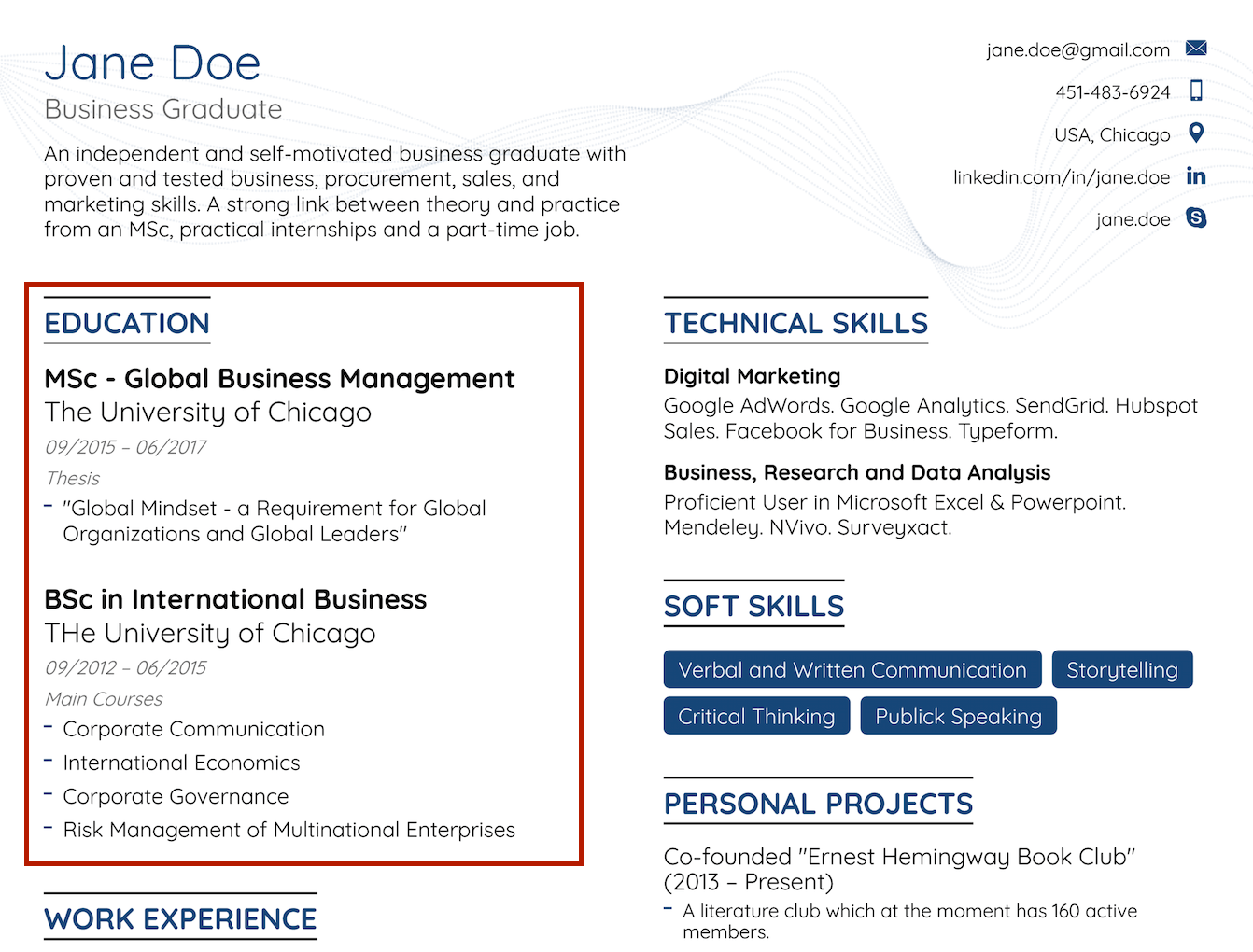
In your average resume, the first section would be work experience.
Since you don’t have any, though, you’ll want to omit that and replace it with the education section.
This way, you bring a lot more attention to your education, which is one of your main selling points.
What should you include in the Education section?
List the following features in this order:
- Name of the degree
- Name of the institution
- Years attended
- Location of the institution (optional)
- GPA (optional)
- Honors (optional)
- Relevant coursework (optional)
- Exchange programs (optional)
As a general rule, if you studied in a prestigious university, you can add the name of the institution before the degree. This way, you will catch the recruiter’s attention faster.
All clear?
Good!
Now, let’s go through some real-life examples:
BA in Computer Science
Tufts University
Medford and Somerville, Massachusetts
10/2015 - 06/2018
Magna Cum Laude
- 3.87 GPA
- Exchange Program in Greenville, NY
University of the Arts London
BA in Interior Design
10/2017 - Ongoing
Westwood High
Boston, Massachusetts
Class of 2018
Education Section Q&A
Still have some questions about the education section? Worry not, we’re about to give you all the answers!
Do I include my GPA?
- The answer here is a “maybe.” We’d recommend including a GPA if it’s higher than 3.5. Anything lower than that, and you might be underselling yourself. Keep in mind, though, that most employers don’t care about your grades.
Should I include my coursework?
- Yep, but just as long as it’s relevant. If you have no work experience, including courses can help establish your expertise in a field. Feel free to skip out on any basic courses, though. No one cares about your Maths 101 course.
Do I mention my degree if I dropped out?
- If you studied for more than 2-3 years, yes. A half-finished degree is still better than no degree. If you dropped out after a semester, though, that doesn’t really mean much.
Do I mention my high school degree?
- Only if it’s your only degree. If you have any higher education, your high school degree will only take up space.
4 Sections to Replace Work Experience [With Examples]
Now that you’ve listed your education, it’s time to fill that work experience gap in your resume.
You aren’t still worried about your lack of experience, right?
Because here are four sections you can use instead:
1) Internships
Have you done an internship that is relevant to the position you are applying for?
Now’s the time to mention it.
Here is how you add an internship to your resume:
First, place the Internship section right after the education section.
Title it: Internships
Second, write your internship title and role. Be specific.
If your internship was in the marketing department, instead of just “Intern”, say “Marketing Intern”.
Third, put down the company name, location, and duration of the internship - in that order.
Marketing Intern
Full Picture
New York, NY
09/2019 - 12/2019
Easy and straightforward, right?
One more step:
Last, add a list of responsibilities you had as an intern in bullet point form.
If you have any tangible achievements, even better! Write those in as well.
Finally, tailor both the responsibilities and achievements to the role you’re applying for.
Here’s how that looks in practice:
You used to be an Advertising Intern.
Scenario 1
You’re applying for the position of Social Media Assistant.
Here’s how you would put down your internship entry:
Internships
Marketing Intern
Full Picture Company
New York, NY
09/2019 - 12/2019
- Analyzed various social media platforms for trending content
- Managed company social media accounts
- Posted interested content on company Facebook page, increasing engagement by 25%
The listed responsibilities and achievements are directly connected to the Social Media Assistant job requirements.
Scenario 2
You’re applying for a Content Writer position. Take a look at the same entry now:
Internships
Marketing Intern
Full Picture Company
New York, NY
09/2019 - 12/2019
- Assisted the Marketing Manager in writing press releases and new blog posts, which increased web traffic by 25%.
Notice how the internship title remains the same.
But in this case you’re applying for a Content Writer position, so you are highlighting your writing experience instead.
For more examples, check out our full guides to an internship resume and how to write a cover letter for an internship.
2) Extracurricular activities
Still have a ton of empty space in your resume?
Extracurricular activities are always a great addition!
Whether they’re related to the job you’re applying for or not, they still show one thing:
You’re hard-working and motivated.
Imagine you’re the HR manager, and you can pick between these 2 candidates:
- Josh Johnson. Studied at Massachusetts State. 4.0 GPA, but that’s all he did in college - no extracurricular activities, internships, or anything else.
- Suzie Activeson. Also studied at Massachusetts state. 3.2 GPA. Vice-president of the business club. Served as a student government senator for 2 semesters. Organized several events as part of the marketing club.
Sure, Josh is probably qualified, but we don't know anything about him, other than that he studied a lot.
Suzie, on the other hand, can manage a team (business club VP), organize events (marketing club), and is passionate about making a change (student government).
So, which one would you pick?
Exactly!
Now, let’s explain how to list extracurricular activities on your resume:
- Title of the section: Extracurricular Activities
- Name of the organization and/or team
- Your role in the organization
- Time period
- Noteworthy awards or achievements
Extracurricular Activities
Public Speaking Club
Vice-President
09/2018 - 09/2019
- Organized 10+ public speaking lectures
- Brought in speakers from all over the state
- Conducted public speaking workshops
3) Volunteering Experience
Volunteering shows dedication and passion to apply yourself.
And there’s nothing recruiters love more than a committed employee.
Whether you spend your free time in a soup kitchen, or you helped collect trash in the countryside, you can mention it in your resume!
But how do you list volunteering experience?
Well, it follows the same logic as your internship and extracurriculars:
- Title of the section: Volunteering Experience
- Name of the organization
- Location
- Time period
- Relevant tasks and achievements (bullet points)
Volunteering Experience
Grand Archive Library Volunteer
Washington, D.C
08/2017 - 02/2019
- Performed secretarial activities, such as sorting mail, filing documents, answering phone calls, and taking messages.
- Led a poetry reading event twice a month.
4) Projects
In this section, you can add any relevant projects you were part of during your time in school or at an internship.
Your capstone project, graduation thesis, or research project go here.
No need for work experience!
You can also mention any other type of project you’ve worked on in school, including:
- Business project for a real-life client
- Mock website you created in Web Design 101
- Fake magazine you created as a capstone project
- Market research you did as part of your graduation thesis
- Software you developed in Software Engineering class
...And so on!
Here’s how you put them down:
- Title of the section: Projects
- Project name
- Project type
- Related organization
- Time period
- Relevant responsibilities and achievements (optional)
And now, for some practical examples. Here’s what a journalism student project could look like:
Online Privacy and Social Media: a Journalistic Study of Facebook and Cambridge Analytica
Journalism Capstone Project
Harvard University
09/2018 - 11/2018
And here’s a law school example:
U-Visa
In-House Pro Bono Project
Columbia Law School
11/2018 - 03/2019
- Completed a full petition for U nonimmigrant status, interviewed legal persons and drafted affidavits.
If you have anything physical to back up your project with, feel free to include a link.
For example, if you’re a developer, you could include a link to your GitHub profile.
Stand out with your Skills
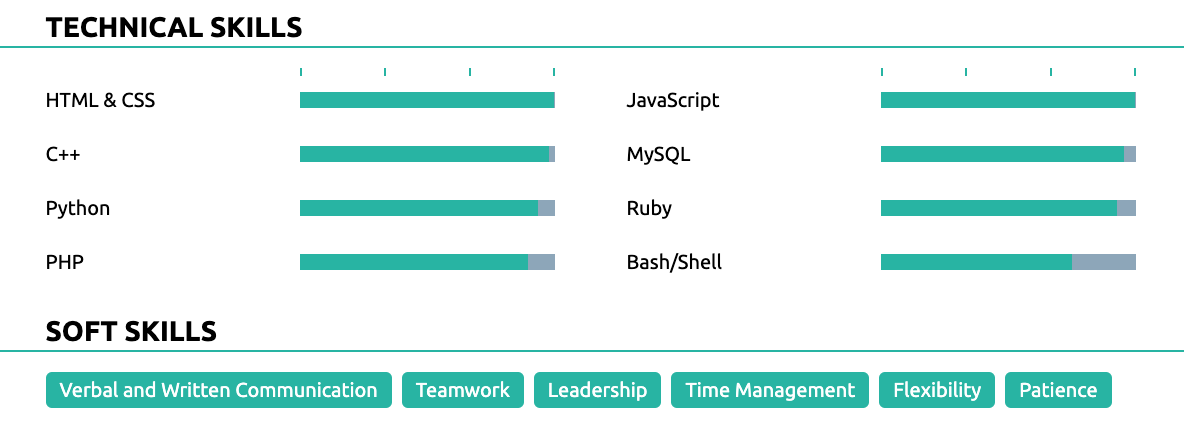
There are two types of skills you can include on your no-experience resume:
Soft skills and hard skills.
What’s the difference?
Soft skills are attributes or habits that describe how you work. They are not specific to a job, but indirectly help you adapt to the work environment.
Here are some of the most popular ones: teamwork, responsibility, leadership, creativity, etc.
Hard skills, on the other hand, refer to specific tools, technical knowledge and training and other work-specific skills. They apply directly to the job.
Technical writing, C++, financial accounting, etc. are all examples of hard skills.
So, which of these skills should you include?
That depends on a lot of factors, but as someone with no work experience, you should opt more for hard skills.
See, you could write all the cool buzzwords like “Critical Thinking” and “Leadership,” but the recruiter won’t believe you.
Fun fact - that’s what 90% of students do.
Instead, you should focus on skills that make you stand out, and in most cases, those are hard skills.
So, how do you decide which hard skills to mention? Easy! Just check the job ad you’re applying for.
Let’s say you’re applying for an entry-level creative internship, and you find these requirements in the job description:
- Video editing experience (Premiere, After Effects)
- UI design experience
- Photo editing experience (Photoshop)
- Photography experience
- Experience with Adobe Illustrator
You’d transfer this into your skills section:
- Premiere & After Effects - Expert
- Photoshop - Expert
- UI Design - Intermediate
- Adobe Illustrator - Intermediate
- Photography - Intermediate
Not sure which skills to mention? Check out our article on 150+ must-have skills for all sorts of professions!
Other Sections You Could Include in a No-Experience Resume
A resume without experience does have one advantage: extra space.
You can use this space to create other sections that highlight how awesome you are!
Here are some sections you could include:
- Hobbies and Interests. Add flair to your resume by showing your genuine passion and interest in the industry.
- Languages. Do you know a second language? Or even a third? Awesome! Most companies these days are pretty international and appreciate an extra language skill or two. Be mindful not to over-exaggerate your proficiency, though. Only knowing how to ask “¿Donde está la biblioteca?” doesn’t warrant a Spanish entry on your resume.
- Awards & Certifications. Do you have any fancy pieces of paper that show you’re smart? Maybe it’s an award for a terrific essay in a competition, or a certificate from an online course. Whichever the case may be, awards and certifications show that you’re a winner, so definitely include them in their own respective section.
Need Inspiration? 2 No Work Experience Resume Samples
Do you still have questions or don’t know where to begin?
That’s when a resume sample comes in handy.
It provides you with a predetermined format.
It also helps you picture how your no-experience resume is supposed to look like.
As Picasso put it: Good artists copy; great artists steal!
Here are 2 no work experience resume samples you can borrow ideas from:
Business Student Resume Sample
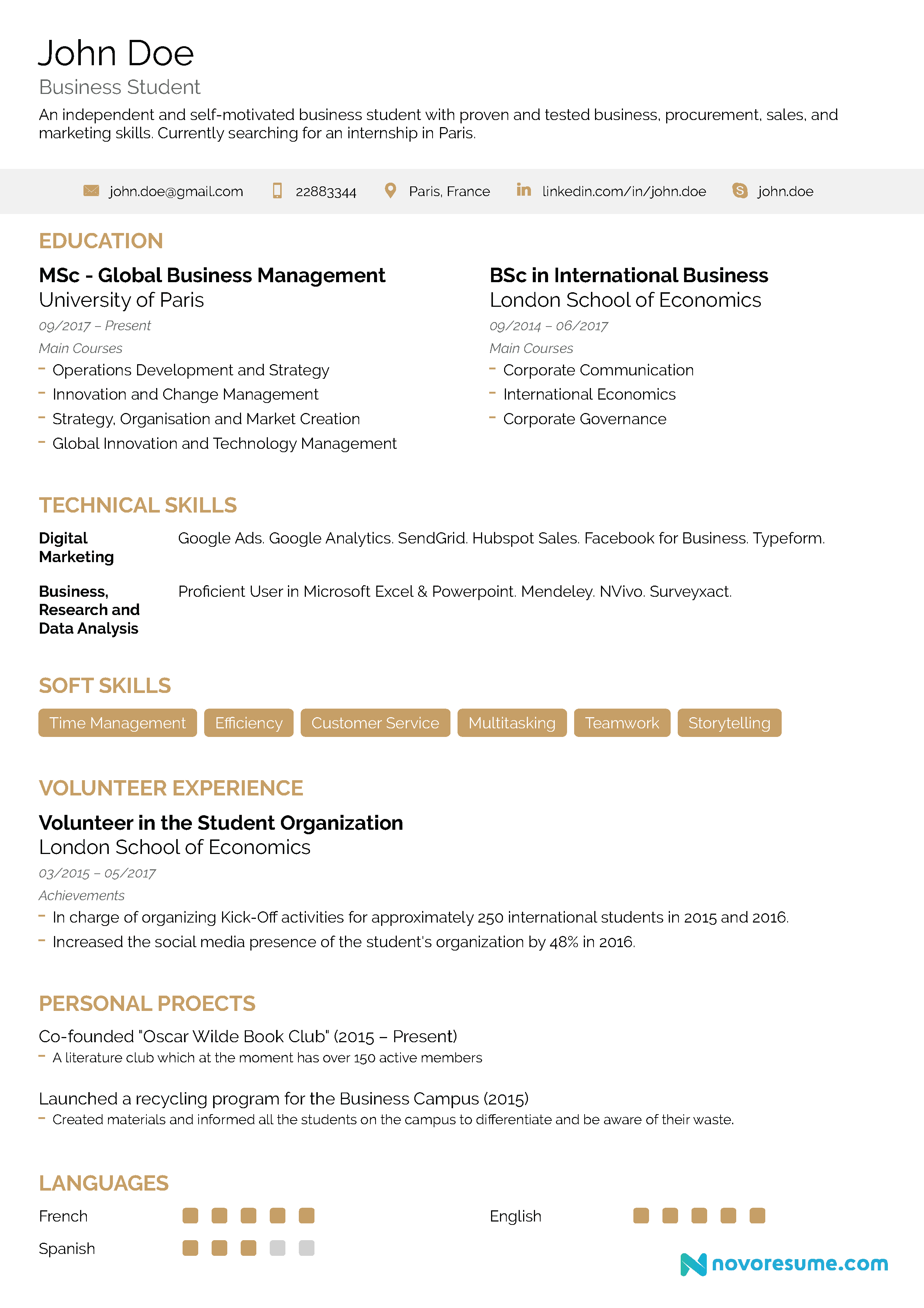
High-school Student Resume Sample
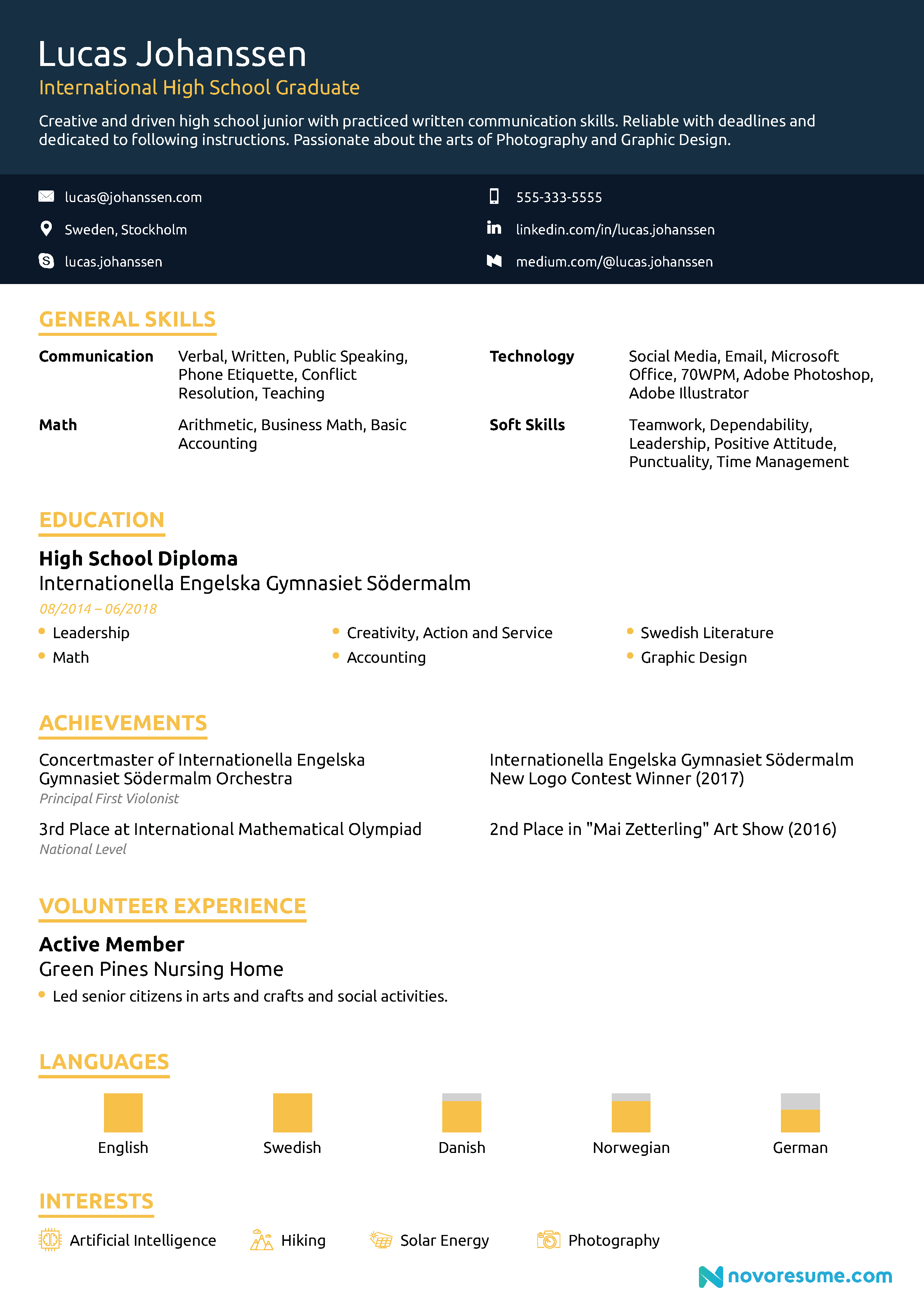
Create a Matching Cover Letter
All done with your resume?
It’s not over yet. You need to write a cover letter to go with it.
A cover letter is a single-page letter that accompanies your resume and is part of your job application.
Look at it this way: your resume describes your experiences, and your cover letter explains (in simple words) how they’re relevant to the job.
Now, here’s a quick infographic on what to include in a cover letter:
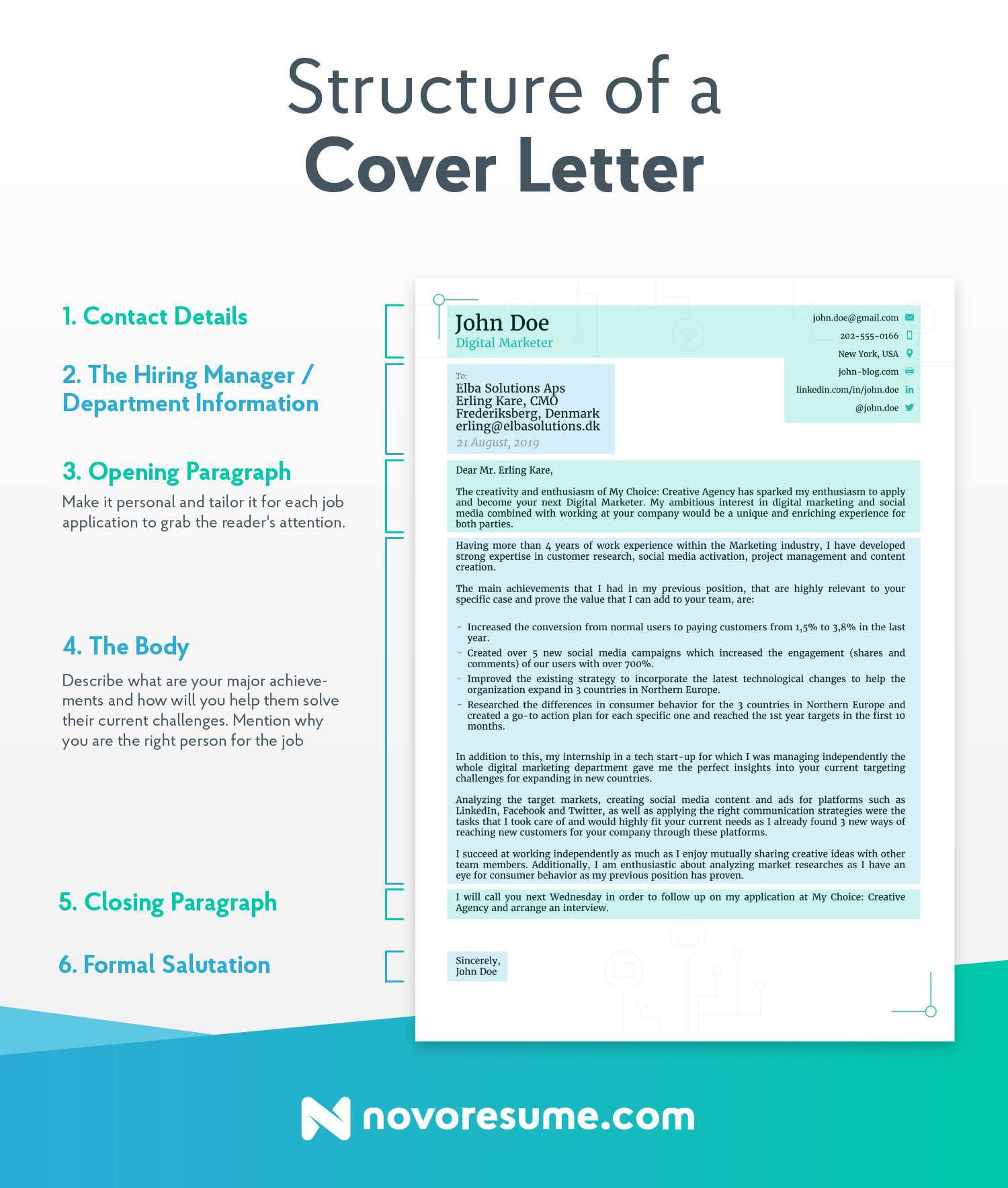
Finally, as with everything else in your resume, make sure to keep your cover letter relevant, short, and concise.
The hiring manager doesn’t have time to read an autobiography, they’ll only review your cover letter for a few minutes.
There’s a lot more to creating a good cover letter than what we just explained.
For a complete, all-you-need-to-know walk-through, check out our Complete Guide on How to Write a Cover Letter!
Key Takeaways
...and that’s a wrap!
At this point, you should know everything there is to know about writing a killer no-experience resume.
Just to keep things fresh, though, let’s quickly go through everything we’ve learned so far:
- When creating your no-experience resume, use the reverse-chronological format.
- You can create a killer no-experience resume by emphasizing your education instead. Include relevant internships, soft & hard skills, and projects.
- Other sections you can include on your resume are hobbies & interests, languages, certifications, or achievements.
- Keep all the content on your resume clear, precise, and relevant. Use bullet points for all your descriptions.
- After you’re done with your resume, you want to write an awesome cover letter that goes with it. The cover letter is a one-page letter that tells the story behind your resume content and reemphasizes why you’re a great fit for the job.



